| Reviews & Columns |
|
Reviews DVD TV on DVD Blu-ray 4K UHD International DVDs In Theaters Reviews by Studio Video Games Features Collector Series DVDs Easter Egg Database Interviews DVD Talk Radio Feature Articles Columns Anime Talk DVD Savant Horror DVDs The M.O.D. Squad Art House HD Talk Silent DVD
|
DVD Talk Forum |
|
|
| Resources |
|
DVD Price Search Customer Service #'s RCE Info Links |
|
Columns
|
|
|
Captains and the Kings
A sprawling, dynastic TV melodrama, simply if often erratically told and performed. Koch Vision has released Captains and the Kings, the 1976 NBC miniseries based on the Taylor Caldwell best-seller that followed the Kennedy-esque fortunes of the Irish Catholic Armagh family from the mid-19th to early 20th century, while spinning a complicated conspiracy theory of international skullduggery. Starring an immense cast of familiar TV and movie favorites (along with some then-newcomers), Captains and the Kings probably plays best for those who fondly remember this early miniseries, or for fans of that particular genre.
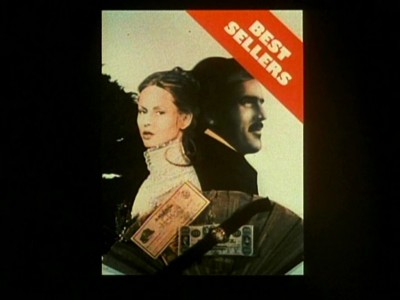
The plot for Captains and the Kings is far too involved (the miniseries runs over eight hours long) to warrant anything more than a brief synopsis - and one that won't ruin too many of the story's twists and turns. In 1857, young Irishman Joseph Armagh (Johnny Doran) arrives in New York harbor with his mother and his two younger siblings, Mary and Sean. When his mother dies onboard, Joseph tries to find his father who was last reported in Philadelphia; Joe soon learns his father died, as well. Rejecting his own religious upbringing because of the death of his mother, Joe still finds shelter in the church when he leaves his brother and sister with Sister Angela's (Celeste Holm) orphanage in a small Pennsylvania town. Determined to make enough money to give them a good life, Joe also vows to become powerful enough to rub his Irish Catholic heritage - which he feels he must suppress in order to truly succeed in Protestant America - in the faces of those who look down on "Roman papists" like himself.
Through a steady succession of menial jobs, proud, stubborn Joe saves every penny he makes, paying for his siblings' care (even though Sister Angela insists it isn't necessary). Soon, Joe discovers that illegal means secure money much quicker, and in far greater quantities, when he finds himself running bootleg whiskey for R. J. Squibbs (Ray Bolger). Joe's education and refinement comes from the help of gorgeous Katherine Hennessey (Joanna Pettet), who lends him books and who provides a quiet, gentle - and unspoken - object of love and beauty. Katherine's husband, drunkard politician Tom (Vic Morrow), wishes to adopt Sean and Mary, setting off a feud with Joe that will eventually lead to tragedy for all concerned. Joe leaves the area and continues to advance his fortunes, falling in with oil magnate "Big" Ed Healey (Charles Durning), who has quite an unorthodox home, complete with two former prostitutes he's "bought": sultry, mysterious Martinique (Barbara Parkins), who falls in love with Joe but who refuses to discuss why she lives with Big Ed; and sweet, simple Miss Emmy (Beverly D'Angelo), who soon falls for Joe's sidekick, Lebanese lawyer Harry Zieff (Harvey Jason).
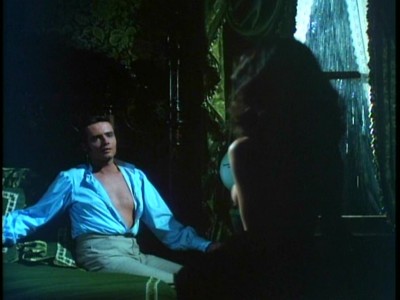
After a brief stint as a gunrunner during the Civil War, Joe moves deeper into the oil business, securing seemingly worthless oil leases that soon pay off substantially when the technology arrives to drill deeper into the land. Joe soon ties himself more closely with Big Ed when he invests in Ed's company, a tie that takes on deeper meaning when Joe falls in love with Ed's daughter, refined, strong Elizabeth (Blair Brown). When Big Ed dies, Joe's cut of the inheritance is qualified by his duty to invest Elizabeth's money, as well. Moving into the refinery business, Joe makes a fateful decision to go in with powerful railroad magnate, Charles Desmond (Robert Vaughn), who is a member of a shadowy cabal of international bankers and businessmen who quite literally control not only the businesses of the world, but their governments - and thus their populaces - as well. Joe sees this group as his stepping stone to making the Irish in America acceptable, particularly when he commands for his son, Rory (Perry King), to be the first Irish Catholic president. But somewhere along the way, Joe's idealistic, angry goal was supplanted by hatred and vengeance and cold, unemotional ruthlessness in pursuit of personal power. It is this sickness that eventually sets into motion a series of events that will spell tragedy for the Armagh family.
For anyone growing up in the 1970s, and who watched a lot of TV (we all did), the introduction of the "miniseries" was a notable development in TV programming. It's almost impossible today to try and convey the culture of a three-network-only TV environment back then to post-cable viewers, particularly with the absolutely dizzying array of media choices younger viewers have today. But suffice it to say, most Americans were fairly involved or at least knowledgeable about what was happening on the schedules over at CBS, ABC, and NBC - the only games in town. So when the networks invented "big event" specials like the "miniseries," it was rather an exciting concept. TV was always viewed as the smaller-budgeted, smaller-scale cousin of feature motion pictures (even though far more people watched TV than went to the movies), so anything that approximated the big-budget, big-buzz spectaculars one could find at their local movie house, was a welcome novelty on TV.
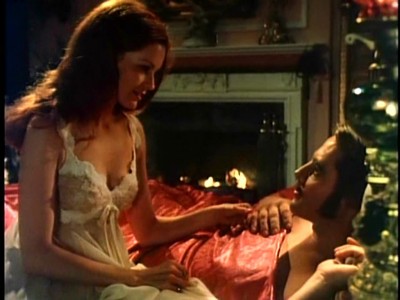
For anyone growing up in the 1970s who watched a lot of TV (we all did), the introduction of the "miniseries" was a notable development in TV programming. It's almost impossible today to try and convey that culture of a three-network-only TV environment to today's post-cable viewers, particularly with the absolutely dizzying array of media choices we now have. But suffice it to say, most Americans were fairly involved or at least knowledgeable about what was happening on the schedules over at CBS, ABC, and NBC...because they were the only games in town. So when the networks invented "big event" specials like the miniseries, it was rather an exciting concept to the average viewer. TV was always viewed as the smaller-budgeted, smaller-scale cousin of feature motion pictures (even though far more people watched TV than went to the movies by the 70s), so anything that approximated the big-budget, big-buzz spectaculars one could find at their local movie house, was a welcome novelty on TV.
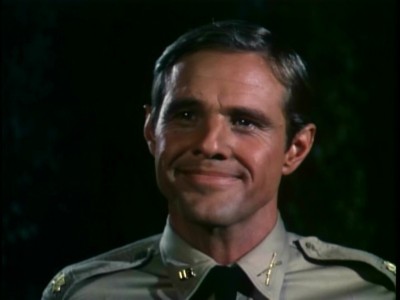
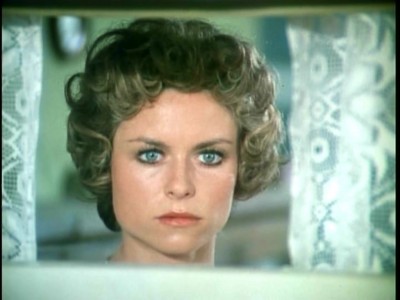
You can try and tell people (and some critics and reviewers who should know their TV history better) that ABC's blockbusters Rich Man, Poor Man and Roots weren't the very first one-two punch in the primetime TV miniseries genre, but don't bother; the mammoth ratings success of those two seminal TV events have all but obliterated the memory of the two miniseries that preceded both of them (you can debate the appearance of PBS-imported minis from Britain). The very first "official" primetime network miniseries was NBC's four-night airing of Joseph Wambaugh's The Blue Knight in November of 1973 (almost three years before Rich Man, Poor Man), starring big-screen idol William Holden in one of his finest performances as over-the-hill beat cop, "Bumper" Morgan. NBC took a huge gamble with this programming move (would people have the patience to stick out the film, night after night, for four nights?), one that drew decent but not overwhelming ratings. ABC would validate the new programming concept later in April, 1974, with its airing of Leon Uris' Holocaust courtroom drama, QB VII, the second official miniseries to air on American network TV, and a solid ratings winner. ABC, confident that they had hit on a limited format that could deliver ratings bumps during important "sweeps" periods (as well as being mindful of the relatively small but still impressive ratings' increases they saw with PBS stations importing British "minis" like Upstairs, Downstairs), went ahead with plans to adapt more novels for television, including the upcoming February, 1976 blockbuster, Rich Man, Poor Man (it's debatable to include ABC's Eleanor and Franklin, which premiered in January of 1976, because it only consisted of two parts - more like a two-part movie special rather than a true miniseries).
But NBC was watching the success of QB VII, as well, and convinced that their own earlier foray into the miniseries format with The Blue Knight was a correct one, they rushed NBC's Best Sellers into production, an umbrella title for four of their planed miniseries for the 1976-1977 season (a fifth mini, The Moneychangers, would debut on NBC's The Big Event series in December). Captains and the Kings would lead off the year, followed by adaptations of Anton Myrer's Once an Eagle, Norman Bogner's Seventh Avenue, and Robert Ludlum's The Rhinemann Exchange. Airing on Thursday nights at 9:00pm, none of the minis debuting under the NBC's Best Sellers moniker garnered ratings anywhere near ABC's Rich Man, Poor Man (which had finished up 2nd for all shows in the 1975-1976 Nielsen's). Up against heavy hitter Hawaii Five-O on CBS (tied for 18th for the year), audiences were somewhat indifferent to these weekly minis, going so far as to support unlikely success The Tony Randall Show over on ABC, which even managed to crack the Nielsen Top Thirty at 29th for the year - something NBC's Best Sellers could not. Of all the minis presented under the NBC's Best Sellers umbrella, though, Captains and the Kings was the most successful, even garnering a repeat airing in the spring (no doubt to capitalize on the enormous new publicity given to the miniseries genre with the success of Roots in January of 1977).
SPOILERS ALERT!
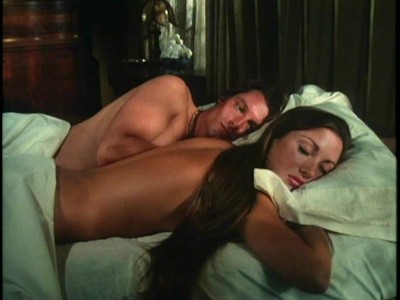
Quite frankly, the history of Captains and the Kings is at least as interesting as the miniseries itself. I haven't read the novel on which this mini is based, so I can't vouch for the mini's fidelity to the story, but this eight-parter, while superficially involving, certainly isn't any great shakes in comparison to later, more ambitious TV minis. Adapted and co-directed by Douglas Heyes (whom I know primarily as the screenwriter for Ice Station Zebra), Captains and the Kings is fairly unimaginative in both its scripting and particularly in its direction (there are maybe two or three shots total that are memorable), with static close-ups dominating the visual design, while the story lurches from one set-up to the next, sometimes leaving huge gaps in the presentation that further disconnects the viewer from the central storyline. The telescoping of what must have been a rather involved story, as well as the basic editing of the sequences, is often times atrocious. There's no flow from sequence to sequence; each new scene butts up against the previous one with little finesse or care for a unifying rhythm. A good example is the important subplot of Elizabeth seducing Tom Hennessy and becoming pregnant with his child. The actual seduction occurs within a shadowy frame where you can't tell what is happening to whom (it lasts all of about ten or fifteen seconds, with only accompanying moans and groans), followed by an immediate jump a scene or two later, where she's telling him she's pregnant. Obviously, I understand the notion of time lapse between scenes, but this is ridiculous - particularly after you're not even sure if they slept together or not. As well, characters come and go with barely an introduction, and yet they drive significant plot points, resulting in either confusion or apathy on the part of the viewer. Joe's siblings Mary and Sean are often mentioned, but never seen again after the first chapter, but when they do show up as adults, we're supposed to care about them and their relationship with the cold, imperious Joe. But if we were never given a chance to get to know them as characters prior to their leaping onto the scene, why should we care about whether or not they get along with the main lead? We simply don't know them.
Original fans of Captains and the Kings will probably respond best to this new DVD; nostalgia for a film from our youth can cover a multitude of screenwriting and directorial sins. And to be fair, Captains and the Kings, despite its clunky construction and indifferent mounting, does, ultimately, have that "serial pull" that any long story has, in a film or book or TV mini, where we want to know how it's all going to turn out in the end. Juggling two main story themes - Joe's ruthless rise to become one of the world's most powerful men, and the international cartel of bankers and businessmen who control the world's economies and politics - Captains and the Kings does have the weight of all that exposition to keep you coming back for more. The script's obvious parallels to the Kennedys will make the end result of Captains and the Kings obvious, but the conventions of the mid-70s TV mini, along with some adept performances, should keep vintage TV fans interested.
Sex certainly was the number one selling point for such minis back in the mid-70s (even Roots, before it was canonized out of all proportion to legitimate criticism, was accused of pushing sex into its storyline to feed ratings), and its inclusion in a 70s mini was expected. Again, in the shadow of today's no-holds-barred TV climate, it's impossible to convey how chaste primetime network TV was back then, so the sex you'll see in Captains and the Kings, while relatively "hot stuff" for Mom and Pop tuning in back in 1976, wouldn't even warrant a "G" rating today. Still, the cast is attractive, and that particular convention is well-handled by some heated performers. I'll leave it up to the female viewers (and readers) as to the sexual effectiveness of Richard Jordan's angrier, less sympathetic Rhett Butler take-off, but strictly from a performer/role match, Jordan gets the unrelenting anger and coldness of Joe down pat (Jordan was always good playing villains on the big screen), but I'm not sure he conveys enough sweep and romanticism to appropriately "round" the character. Perry King fits the bill as the handsome, relatively naïve Rory (again, ladies, it's your call as to whether or not he's "shirtless" worthy), but I can say that the women's roles are cast quite nicely. Blair Brown (more about her down in the extras section) seemed a little arch and stagy for the central Elizabeth character, but Barbara Parkins is appropriately lush and sultry and mysterious as Martinique, with that perfectly modulated, cultured, low voice of hers (huge crush on her since Valley of the Dolls), while Jane Seymour is heartbreakingly, perfectly beautiful (when wasn't she?) as Rory's true love, Margery. While the always excellent Charles Durning probably gives the best overall performance here among the familiar TV stars, I suspect it will be the romantic scenes between the attractive performers that will generate the most interest for viewers of Captains and the Kings.
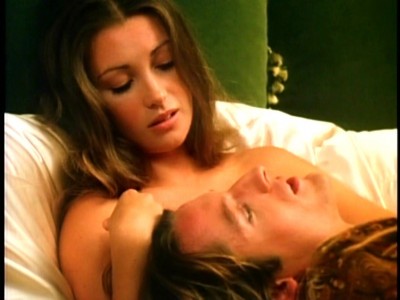
The DVD:
The Video:
The full-screen, 1.33:1 video transfer for Captains and the Kings is more than adequate, with the expected screen anomalies one would find in such a title from over thirty years ago. The transfers show small signs of scratches, dirt, and occasional wobbling (although none of them are too distracting). Interlacing was evident, but I saw no compression artifacts. Color was correctly valued (if at times a tad faded or muddy), with an overall sharp image.
The Audio:
The Dolby Digital English split mono track accurately captures the original broadcast presentation. Dialogue is crisp, with hiss kept to a minimum. There are no subtitles or close-captions.
The Extras:
There's an exclusive interview with Blair Brown, who discusses her career and her role on Captains and the Kings. It runs 16:20, and it appears to have been shot on the fly, in a dressing room or a "green" room, perhaps. Brown's comments are general; nothing in depth is discussed about the project, but at one point, Brown makes this rather surprising statement, covering the actors that were chosen for the project: "...then there were a few sort of "television names" who were probably less inspiring as actors...." The normal S.O.P., hypocritical or not, for these types of interviews is for the actor - regardless of their feelings towards their castmates - to generally praise everyone and move on. It's considered "being polite," for lack of a better phrase. I don't think Blair is deliberately trying to be impolite here, but the casual, haughty way she throws this snobby statement out (while the featurette editor flashes clips of the various actors over her statement, implying they indeed may be those "less inspiring" actors) is a big turnoff - particularly when Blair fairs no better (and in comparison to some, quite less so) than the "less inspiring" TV actors she co-stars with in Captains and the Kings. If I were to be equally offhanded about any statement concerning Miss Brown, I might suggest that years from now when viewers are still enjoying those "less inspiring" TV actors in roles we all know and love, those same viewers may also be searching to remember who, exactly, was Miss Brown.
Final Thoughts:
NBC's vintage mid-70s miniseries Captains and the Kings, is big, with a complicated narrative. But it's also rather clunky in design and execution, with no rhythm or pace whatsoever. Still, the cast is attractive, and the conventions of the genre - namely sex and the serial pull of wanting to see what happens next - help smooth over the less-than-inspired story-plotting and direction. Fans of vintage TV and specifically of the miniseries genre should see this early example of the form - you'll enjoy the nostalgic atmosphere of the production - while newcomers interested in the stars or the novel's author, should rent Captains and the Kings.
Paul Mavis is an internationally published film and television historian, a member of the Online Film Critics Society, and the author of The Espionage Filmography.


|
| Popular Reviews |
| Sponsored Links |
|
|
| Sponsored Links |
|
|
| Release List | Reviews | Shop | Newsletter | Forum | DVD Giveaways | Blu-Ray | Advertise |
|
Copyright 2024 DVDTalk.com All Rights Reserved. Legal Info, Privacy Policy, Terms of Use,
Manage Preferences,
Your Privacy Choices | |||||||














